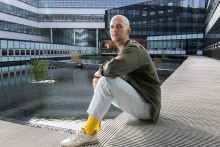‘My first study, hydrogeology, was not satisfying for me. I craved something with a broader perspective and tried my luck in applying for Erasmus Master’s. I was accepted with a full scholarship, and it was a life changing experience. It was my desire to be a part of something big, something of global importance, such as the UN or WWF, and work on environmental issues. That’s how I discovered Professor Arjen Hoekstra and his ERC-funded project focused on humanity’s water footprint – a challenging topic and a perfect fit for me.
Shockingly, Arjen died only three months after I started my PhD. It was a major loss for everyone. Shortly after, the grant was cancelled and most of my project fellows had to leave. This took a toll on my motivation.
Oleksandr Mialyk
PhD research topic: Assessing global changes in water footprints of crop production
Work: PhD candidate at Multidisciplinary Water Management group, Faculty of Engineering Technology (ET), University of Twente
Education: Erasmus MSc in Water Science and Engineering from IHE Delft (the Netherlands), TU Dresden (Germany), and Instituto Superior Técnico (Portugal) & MSc in Hydrogeology and Engineering Geology from Dnipro University of Technology (Ukraine)
Originally from: Ukraine
Arjen always believed that you could do more than you realized, which was suddenly missing. Luckily, I still had great supervisors and colleagues. But not long after, the COVID-19 pandemic started which was another big challenge. I spent most of my days locked in my apartment alone with two screens and a connection to a supercomputer, making sure that my research wasn’t delayed. When things began to normalize, another shock came. Russia started a full-scale invasion of Ukraine. For the first month, I was not able to work. Together with other Ukrainian employees, we were trying to collect humanitarian aid and help people who were affected the most. Obviously, my PhD progress was put on hold for a long time.
Now I feel like I’m in a good place. I think I was able to get through everything because I’m quite rational and self-disciplined, like Spock from 'Star Trek'. Yes, I often feel bad about things and the world provides us with plenty of reasons, but then my rational self tells me to move on and focus on what’s within my control.
My PhD research is focused on assessing recent changes in water footprints of 175 crops, such as wheat, tomatoes, apples etc. We’ve developed a global model to simulate crop growth and assess how much water is needed for it. Based on my research, we can see that humanity’s water footprint is increasing even though we are more efficient in our production. Modern farmers can grow more crops compared to the 1990s using the same amount of water. However, the humanity needs so much more produce nowadays that the global water consumption keeps increasing. Now I’m at the last stage of my PhD research, aiming to figure out why exactly this is happening and what we can learn from it.
Because of the global scale of our group’s work, we got interest from the World Bank last year. The World Bank is creating an overview of water resources around the globe, focusing on water scarcity but also water quality. Essentially, they want us to provide fresh estimates for the humanity’s water footprint covering not only crops but also industrial and domestic use as well as international virtual water trade. Some luck came my way, and I was able to work on this project as part of my PhD research. Currently, we are in the final phase of this project and expect the World Bank to publish the report sometime next spring. I hope Arjen would be proud to hear it.
‘Even though my work is only one small part, it is a part of something at the forefront of science’
On top of that, I’ve been a member of the Agricultural Model Intercomparison and Improvement Program (AgMIP), a global community of scientists aiming to provide future projections of crop production. Last year our joint paper made it to the latest IPCC report. Even though my work is only one small part, it is a part of something at the forefront of science. And that feels like the place I want to be.
If you do a PhD, you need to get satisfaction from it and to know that what you do is not for nothing. This struggle is quite common in academia. Many people get imposter syndrome. They think they are not good enough and that their research is useless. Sometimes, I also have these doubts, but I manage to keep them under control.
It all came together for me, despite everything. I really want to stay in academia. In March, I will begin my postdoctoral journey at the UT. I’m actually refusing other job offers because I know what I want—to continue researching the interplay of food and water. There are many challenges where I can positively contribute and perhaps make a difference. I’m still that idealistic.'







